Stories
10 stories that shaped our work in global nutrition this year
December 19, 2025
WP_Term Object
(
[term_id] => 49
[name] => Field Stories
[slug] => all-field-stories
[term_group] => 0
[term_taxonomy_id] => 49
[taxonomy] => news-category
[description] => Discover the personal stories of people whose lives have been impacted by better nutrition, and those working tirelessly to deliver it.
[parent] => 0
[count] => 181
[filter] => raw
)
Improving maternal health and nutrition around the world
Nutrition International advocates for the voices of women to be included in policy and programming decisions to ensure their needs are met. Through programming, women can give and receive the proper healthcare and nutrition needed for mothers and newborns to not only survive, but thrive. Read the stories of women involved in maternal health.
Posted on May 8, 2024
Maternal and newborn health are intrinsically connected. The World Health Organization estimates that 36.5% of pregnant women worldwide are anaemic, which can lead to many complications for both the mother and baby. Anaemia during pregnancy has been associated with higher risks of maternal and perinatal mortality. Nutrition International’s programs support a combination of maternal supplementation and nutrition counselling to improve nutrition in pregnancy, working with governments around the world.
We advocate for the voices of women to be included in policy and programming decisions to help ensure a positive pregnancy, birth and postnatal care. We asked women in maternal health settings why good nutrition matters to them. Here’s what they had to say.
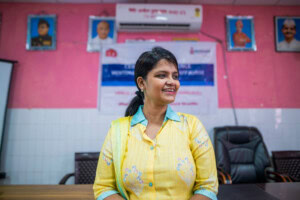
Dr. Shikha Sachan facilitates training sessions and mentors health care providers at the Centre of Excellence in Pt. Kamalapti Tripathi District Hospital in Chandauli, Uttar Pradesh. In 2019, the Government of Uttar Pradesh and district officials established the Centre of Excellence for maternal and newborn health with support from Nutrition International. The centre was designed to provide enhanced services for patients, as well as provide training for healthcare professionals across the district. The Centre of Excellence has hosted many training sessions for healthcare providers, educating nurses and midwives on maternal and postpartum health.
In Dr. Shachan’s words:
“When we train auxiliary nurse midwives and staff nurses, I am very happy to do so because these are the first soldiers in our fight against maternal mortality.
“We are a team working to reduce maternal mortality, and they are our front-line soldiers. Training them has always been a good experience because many of them have doubts, but once they are equipped with training and instruction, they perform wonderfully. When I go for mentoring, I’m overjoyed because they frequently tell me, ‘Ma’am, after your training, we’ve started implementing this.’
“Patients will benefit from our assistance in high-risk pregnancy and timely intervention so that we can work effectively to reduce maternal mortality.”
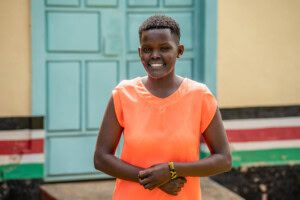
Sherry Wamunyenga is the lead mother of a mother-to-mother support group in Vihiga County, Kenya. Mother-to-mother support groups are community-based initiatives that use peer support to equip mothers and pregnant women with the knowledge and skills needed to ensure healthy pregnancies, safe childbirth and optimal postnatal care.
During sessions, Sherry will walk women through several topics related to maternal health including timely initiation of breastfeeding (within one hour of giving birth), exclusive breastfeeding for the first six months and breastfeeding with complimentary feeding for two years and beyond. Below, Sherry shares her personal experience with breastfeeding.
In Sherry’s words:
“Before the training, initially, I found it difficult to exclusively breastfeed a child for six months. I felt it was challenging. In my mind, it seemed very impossible. I thought about how long that period was, and maybe you also want to go out or have some freedom. You might feel like the baby will consume all your time. After the training, my mindset changed. I started to believe and said to myself, ‘Let me try this, I know I can.’ So, I attempted it and breastfed my child exclusively for six months, and it was successful.
“My greatest joy is seeing children healthy, pregnant mothers healthy, and when a mother gives birth to a healthy baby. That’s one of my biggest sources of happiness. It motivates me to continue impacting them, giving them the strength to keep going. It gives them courage. That’s what truly motivates me to be a lead mother for my group.”
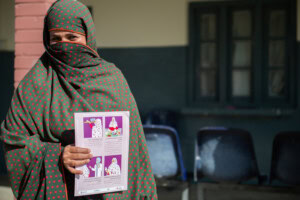
Sonia Hamid attended her basic health unit in Swabi, Pakistan, for an antenatal care check-up at the same time Nutrition International was conducting an implementation research project on multiple micronutrient supplementation (MMS). During her visit, Sonia received MMS along with nutrition counselling. MMS is found to be just as effective at preventing maternal anaemia, while being more effective in improving birth outcomes than solely iron and folic acid supplementation.
During the period of implementation research in the district of Swabi, any time a pregnant woman goes for antenatal care at any public health facility, that woman will be assessed and provided a bottle of MMS along with a standard package of materials.
In Sonia’s words:
“When the lady health worker came to our house and suggested I visit the health centre and told me that they are providing MMS tablets free of cost. I came to the health centre to receive these tablets and I have finished one bottle. I’m feeling much better.
“I wish all women like me receive these tablets so they can use them and get all the benefits from the tablets and give birth to healthy children.”
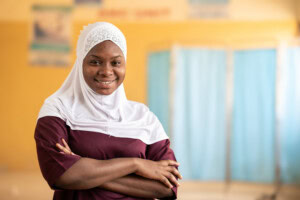
Aisha Jibril is a midwife and antenatal care provider in Jigawa, Nigeria. Aisha’s job as a midwife is to provide nutrition counselling and maternal supplements to pregnant women who visit her. Health workers are receiving training as a part of a gender responsive behaviour change intervention strategy in the state. Aisha provides counselling to equip pregnant women and their families to have the knowledge and access to services that will support them to have a positive pregnancy experience.
In Aisha’s words:
“The barriers we when it comes to maternal and newborn nutrition and health is that some men expect that the woman is supposed to cook for the family, do the house chores, come to the hospital when she’s pregnant, and bring the small kids when they are sick too.
“The role that Nutrition International plays when it comes to gender is very, very important because now in health facilities, we see more men supporting their wives when they come for ANC [antenatal care].
“What motivates me is that I’m a woman, and they said when you want to start a change, start with yourself. So, working in this health facility, I see the challenges women go through when they are pregnant.”
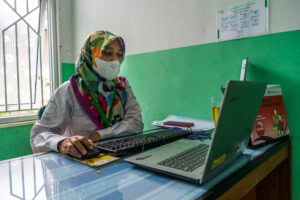
Tita Rosita is a nutritionist at the Puskesmas Situraja in Sumedang, Indonesia. Puskesmas are community health centres that play a critical role in supporting antenatal care and the first 1,000 days from conception to a child’s second birthday. They were targeted as one of the key platforms to address a pervasive health issue in the country: childhood stunting.
Tita is one the nutritionists who received training as part of the Better Investment for Stunting Alleviation (BISA) project. In 2019, Nutrition International and Save the Children launched the project to translate the Government of Indonesia’s national stunting reduction strategy into effective action at the subnational level. Working with the provincial and district health offices, Nutrition International provided technical assistance and advocated for better human and financial resources, stronger policies and accountability mechanisms to improve nutrition before pregnancy and during the critical first 1,000 days.
In Tita’s words:
“Puskesmas [health centres] provide an important role in increasing knowledge, especially in improving nutrition services. It is necessary to provide education to pregnant women and their families so that pregnant women know the adequate nutrition to fulfill their daily nutrition. After attending the BISA training it increased my knowledge and supported nutrition program activities at puskesmas.”
Nutrition International works with governments around the world to have lasting, positive effects on maternal health, improving the lives of mothers and newborns.